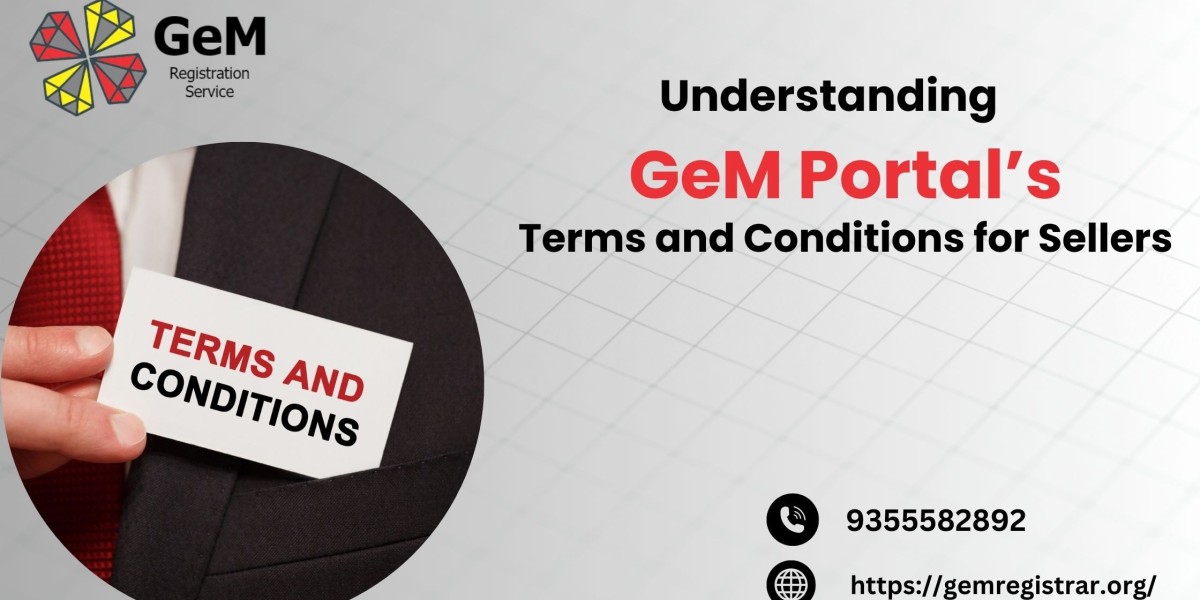The GeM Portal is an online platform designed to make government procurement easier, faster, and more transparent. It connects sellers (businesses and service providers) with government buyers, offering a secure and efficient way to conduct transactions. However, just like any other platform, GeM comes with its own set of terms and conditions that sellers must understand and follow to be successful and compliant. In this article, we will break down the key aspects of the GeM portal’s terms and conditions in simple words so that sellers can navigate the platform smoothly.
What is GeM Registration?
GeM registration refers to the process of signing up as a seller or vendor on the Government e-marketplace platform. Once registered, sellers can list their products and services, respond to tenders, and secure government contracts. The GeM portal is available to all businesses, including MSMEs (Micro, Small, and Medium Enterprises), manufacturers, suppliers, and service providers. By registering on GeM, businesses can participate in government procurement and expand their market reach.
Types of Sellers on GeM
There are several types of sellers on the GeM portal, depending on their business nature:
- Manufacturers: Manufacturers who produce their products can directly list their offerings on the GeM portal.
- Authorized Dealers/Distributors: Dealers or distributors authorized by manufacturers can also register and sell products on behalf of the original manufacturer.
- Service Providers: Businesses offering services like consultancy, IT support, or maintenance can register as service providers and list their services on the portal.
- Traders: Traders who do not manufacture goods but have a supply chain network can also sell products on GeM by registering as traders.
Benefits of GeM Registration for MSMEs
- Increased Business Opportunities: GeM connects MSMEs to government buyers from various sectors like healthcare, IT, infrastructure, and more. By listing their products and services on the platform, MSMEs can access a vast and ongoing stream of government procurement opportunities, improving their chances of landing contracts and boosting their business growth.
- Priority Procurement: GeM prioritizes MSMEs by offering dedicated procurement opportunities, meaning smaller businesses get direct access to government buyers who need goods and services. This priority helps MSMEs stand out among larger, more established companies, increasing their chances of winning government contracts.
- Fair Competition: GeM ensures that all registered businesses—whether small or large—compete on equal terms. The platform promotes transparency, ensuring a fair and competitive bidding process based on quality, pricing, and product specifications. This gives MSMEs a fair shot at winning tenders, helping them grow without facing undue competition from larger corporations.
- Reduced Costs: GeM eliminates the need for intermediaries such as brokers or agents who would traditionally handle government procurement. By cutting out these middlemen, MSMEs save on transaction fees and reduce overall costs, which enables them to offer more competitive pricing to government buyers.
- Increased Visibility: With their products listed on the GeM portal, MSMEs gain higher visibility in the government sector. The platform allows businesses to showcase their offerings, providing detailed descriptions and images that attract the attention of government buyers. As a result, MSMEs can reach new customers and create long-lasting business relationships with government agencies.
- Access to Government Schemes: GeM also provides MSMEs with access to government schemes, discounts, and policies designed to boost their growth. By registering, MSMEs can take advantage of special offers that could lead to even more opportunities for expanding their business.
- Easy Transactions: GeM streamlines the procurement process by providing a simple, user-friendly platform. This simplifies transactions and reduces the complexity for MSMEs when it comes to submitting bids, tracking orders, and ensuring timely payments. A smoother process allows MSMEs to focus on fulfilling orders rather than dealing with paperwork.
- Enhanced Credibility: Being registered on the GeM platform boosts the credibility of MSMEs. As government procurement is a highly regulated and trusted process, MSMEs that participate in GeM gain validation and recognition as reliable suppliers, making it easier to secure business from other sectors as well.
Documents Required for GeM Registration
Here’s a list of the essential documents required to complete the GeM registration process:
- GST Registration Certificate
Your business must be registered for GST to sell goods and services on the GeM platform. This is a mandatory requirement for businesses operating in India. - PAN Card
A valid PAN card is required to verify your business identity and ensure tax compliance. - Bank Account Details
You need to provide the details of a business bank account, including a canceled cheque or bank statement, to facilitate payment processing. - Digital Signature Certificate (DSC)
A DSC is required for signing contracts and tenders electronically. It serves as a secure method to validate your bids and submissions on the GeM portal. - MSME Certificate (for MSMEs)
MSMEs must upload their MSME registration certificate to avail of the special benefits available to small businesses on GeM. - Product and Service Details
Detailed information about your products and services, including descriptions, prices, and specifications, is needed to create your catalog on the portal.
Steps to Register on GeM
The GeM registration process is simple and involves the following steps:
- Visit GeM Website: Go to the official GeM registration portal.
- Enter Details: Fill in basic information like name, email, phone number, and date of birth.
- Pay the Fee: Complete the registration fee payment.
- OTP Verification: Enter the OTP received via SMS or email.
- GeM Confirmation: A GeM representative will call to confirm your OTP.
- Complete Registration: After verification, your registration is done.
- Get GeM ID: Receive your seller ID and login credentials via email.
- Set Up Profile: Login, set up your profile and list your products.
- Submit Caution Money: You'll be notified to submit caution money.
- Select Product Listing: On the dashboard, click Product Listing to add new products or manage your existing ones.
- Choose Product Category: Pick the correct category for your product. This helps government buyers find your product easily.
- Start Selling: Your products are now visible to government buyers, and you can begin receiving orders.
Note: Now easily list your product on the gem portal through gem catalogue service.
Conclusion
The GeM portal offers businesses an incredible opportunity to sell their products and services to the government. However, it’s essential to understand and follow the terms and conditions to ensure a smooth experience and avoid potential penalties. By adhering to the registration requirements, product listing guidelines, pricing, delivery, and legal compliance rules, sellers can make the most of the GeM portal and grow their business.
Understanding these terms not only helps you stay compliant but also builds trust with government buyers, improving your chances of securing contracts and growing your business over time.


